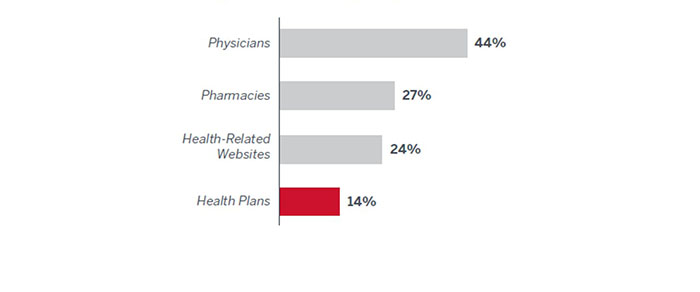Auto logout in seconds.
Continue LogoutAlthough health plans have a wealth of insight and experience that could help members better navigate the health care system, many of them are not interested. Members fear that plans are trying to ration care or direct them to a lower-quality provider.
To make it easier to understand engagement, our research has narrowed it down to three central themes: immersion, passion, and activation.
In the below article, we outline our concept of immersion. To learn about the other concepts and dig into survey data that outlines why members don’t trust their health plans, download part one of our complimentary resource, Shattering the Member Engagement Myth.
Health plans aren't seen as a trusted resource for health information. If members don’t see their health plan as a place to go to ask about health problems, then it will be impossible for plans to engage consumers on better health.
To make it easier to understand engagement, our research has narrowed the critical issues down to three central themes: immersion, passion and activation. The concept of immersion asks a simple question: Are your members thinking about you?
To answer this, consider a situation where members might reach out for help, such as when they need health information:
Trust in Health Information, by Source
Percentage of Consumers Reporting "A Lot" of Trust in:
When surveyed, respondents indicated that health plans are only the last most trusted source for health information, lagging behind physicians, pharmacies, and health-related websites.
Consumers typically associate their health with doctors and other providers, with health-related websites seen as an easily accessible way to learn more about symptoms or possible treatments. In fact, in 2014 a national survey by Pew Research indicated that 72% of adult internet users searched online for health information. This was up from the 61% Pew Research reported from a similar survey in 2009. Health plans, despite their vast resources, are not thought of as a trusted source for health information.
Health plans can’t expect to influence and engage consumers on better health options when they aren’t seen as a primary source of health information.
Immersion is a critical issue that our research indicates is key to better member engagement. To learn about the other themes, download our resource Shattering the Member Engagement Myth: Part One and learn why members don’t trust their health plans.
Don't miss out on the latest Advisory Board insights
Create your free account to access 1 resource, including the latest research and webinars.
Want access without creating an account?
You have 1 free members-only resource remaining this month.
1 free members-only resources remaining
1 free members-only resources remaining
You've reached your limit of free insights
Become a member to access all of Advisory Board's resources, events, and experts
Never miss out on the latest innovative health care content tailored to you.
Benefits include:
You've reached your limit of free insights
Become a member to access all of Advisory Board's resources, events, and experts
Never miss out on the latest innovative health care content tailored to you.
Benefits include:
This content is available through your Curated Research partnership with Advisory Board. Click on ‘view this resource’ to read the full piece
Email ask@advisory.com to learn more
Click on ‘Become a Member’ to learn about the benefits of a Full-Access partnership with Advisory Board
Never miss out on the latest innovative health care content tailored to you.
Benefits Include:
This is for members only. Learn more.
Click on ‘Become a Member’ to learn about the benefits of a Full-Access partnership with Advisory Board
Never miss out on the latest innovative health care content tailored to you.
